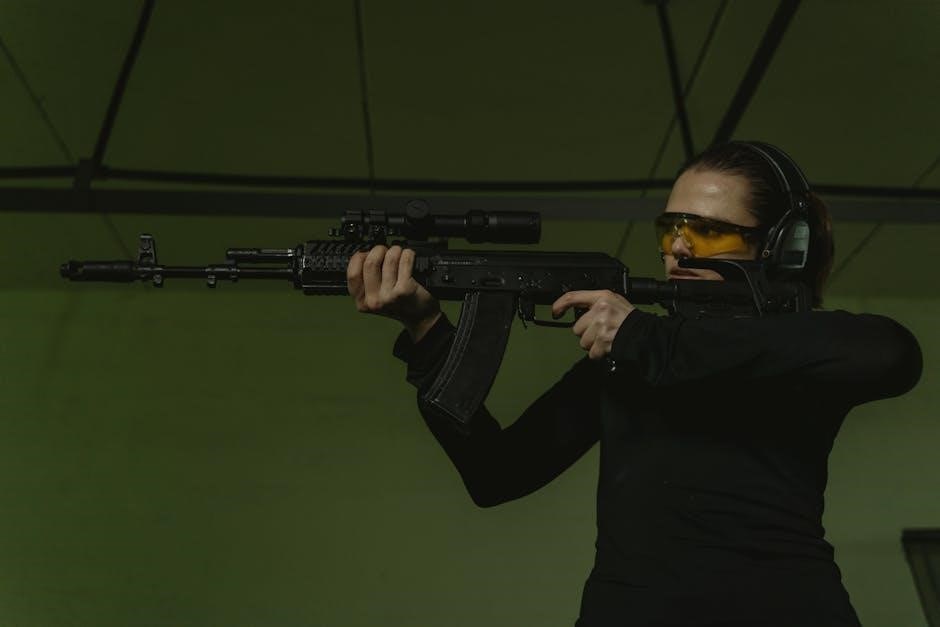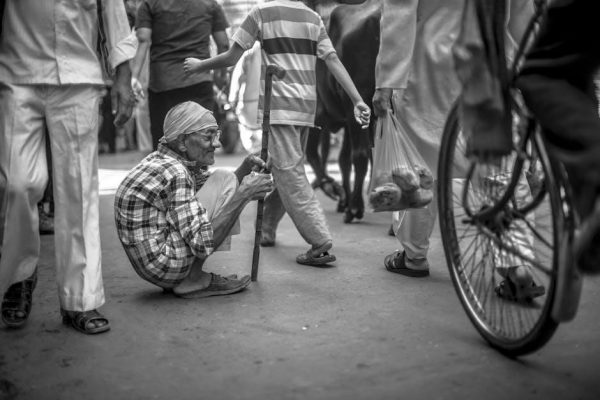Sniper stories captivate audiences with thrilling tales of precision and skill, often exploring the moral dilemmas of warfare. The Sniper by Jim Lindsay reveals the untold story of Chuck Mawhinney, the deadliest Marine Corps sniper in Vietnam, offering a gripping look into the life of a legendary marksman. These narratives highlight the psychological depth and real-life heroism behind the scope, making them timeless and deeply impactful.
Historical Context
Sniper stories are deeply rooted in military history, showcasing the evolution of sharpshooting tactics and their impact on warfare. From the Vietnam War to World War II, snipers like Chuck Mawhinney and Vasily Zaitsev became legends for their precision and bravery. The Sniper by Jim Lindsay highlights Mawhinney’s record-breaking 103 confirmed kills, while historical fiction like The Sniper by James Riordan explores the harrowing experiences of a young female sniper in Stalingrad. These narratives reveal the psychological and strategic significance of snipers in shaping the course of conflicts.
Cultural Impact
Sniper stories have captivated global audiences, influencing literature, film, and public perception of warfare. Books like The Sniper by Jim Lindsay and American Sniper by Chris Kyle have inspired films and sparked debates on patriotism and morality. These narratives humanize snipers, revealing their struggles and triumphs, while also highlighting the psychological toll of their missions. Their stories resonate widely, bridging history with contemporary culture, making them enduringly relevant.
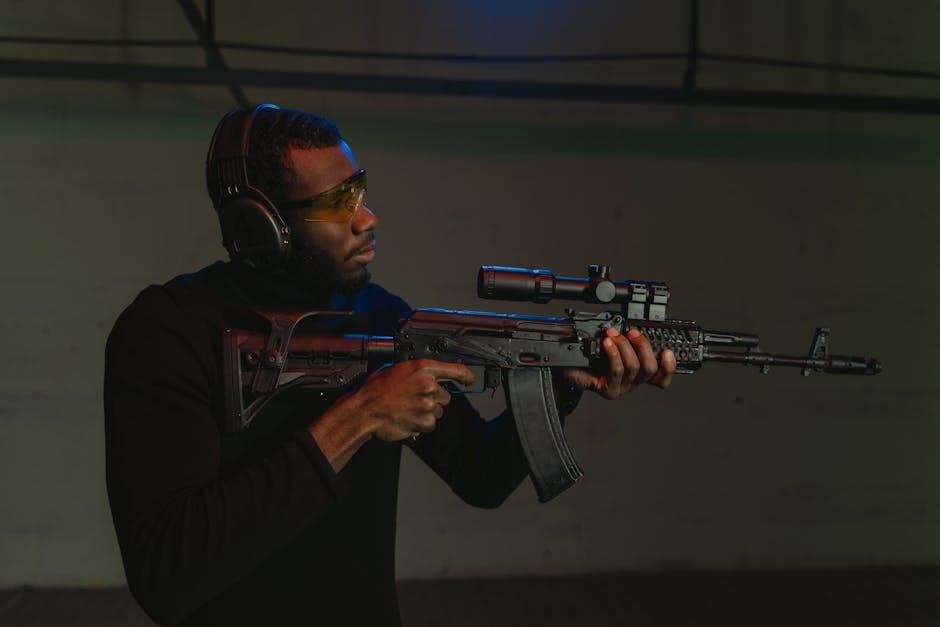
The Life and Legacy of Chuck Mawhinney
Chuck Mawhinney, the deadliest Marine Corps sniper in Vietnam, left an indelible mark on military history with 103 confirmed kills. His story, revealed in The Sniper, highlights his remarkable journey from a teenager in combat to a post-war life of quiet humility, eventually embracing his legacy to inspire future generations through training and advocacy.
Background
Charles “Chuck” Mawhinney, born in Oregon, grew up with a strong interest in firearms and the military. At 18, he enlisted in the Marine Corps during the Vietnam War, quickly distinguishing himself as a skilled marksman. His natural talent, discipline, and focus set him apart, leading to his record-breaking career as a sniper. Mawhinney’s humble beginnings and quiet determination laid the foundation for his legendary status in military history.
Military Career
Chuck Mawhinney’s military career was marked by extraordinary achievements. During his 16-month tour in Vietnam, he recorded 103 confirmed kills, earning him the title of the deadliest sniper in Marine Corps history. His ability to operate in hostile environments and his precise marksmanship made him a formidable figure on the battlefield. Mawhinney’s service showcased his bravery and skill, leaving a lasting impact on military tactics and sniper techniques.
Post-War Life
After Vietnam, Chuck Mawhinney returned to a quiet life, marrying and raising a family. He kept his military achievements private until 1991, when fellow Marine sniper Joseph Ward revealed his record in a book. Initially troubled by the fame, Mawhinney eventually embraced it, using his platform to train others in long-distance shooting and sharing his experiences with the world.
“The Sniper” by Jim Lindsay
The Sniper by Jim Lindsay uncovers the extraordinary true story of Chuck Mawhinney, the deadliest Marine Corps sniper in Vietnam. Written with Mawhinney’s cooperation, it offers an insider’s view of his remarkable career and the psychological toll of warfare, making it a gripping and authentic account of a legendary marksman.
Book Overview
American Sniper: The Autobiography of the Most Lethal Sniper in U.S. Military History, written by Chris Kyle with Scott McEwen and Jim DeFelice, is a gripping memoir detailing Kyle’s experiences as a Navy SEAL sniper in Iraq. The book explores the psychological toll of war, the moral dilemmas of a sniper, and the personal sacrifices of military life, offering a raw and unflinching narrative of modern warfare.
Author’s Perspective
Jim Lindsay’s The Sniper presents a detailed and intimate account of Chuck Mawhinney’s life, crafted with sensitivity and respect. Lindsay collaborates closely with Mawhinney, ensuring authenticity and depth. The book balances the excitement of Mawhinney’s military achievements with the personal costs of his service, offering a nuanced portrayal of a legendary sniper’s journey from obscurity to fame.
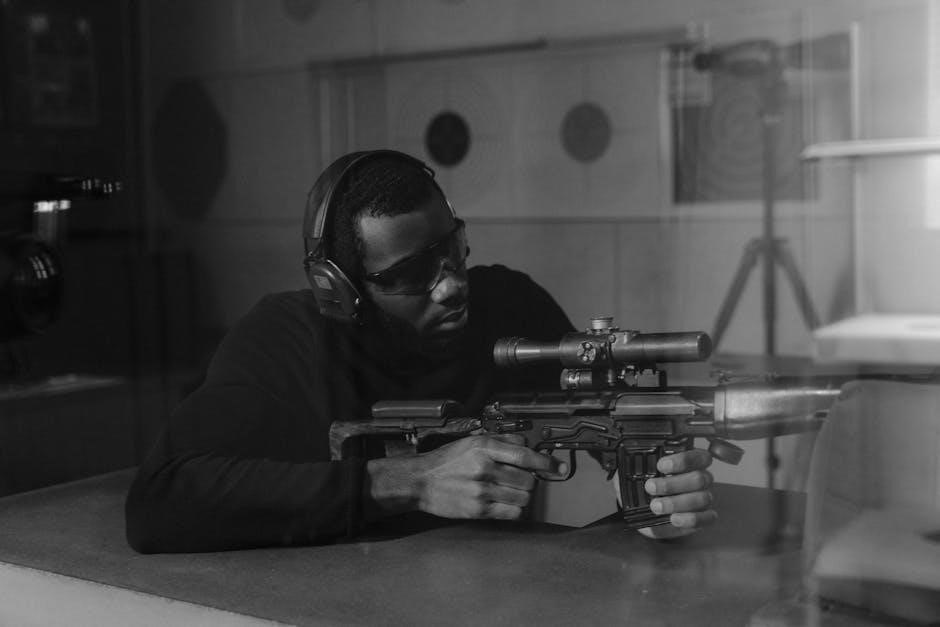
Historical Fiction: “The Sniper” by James Riordan
The Sniper by James Riordan is a gripping historical fiction novel set during World War II, focusing on a young female sniper’s harrowing experiences in Stalingrad.
Plot Summary
The Sniper by James Riordan follows the story of Tina, a 16-year-old girl forced into sniping during the Battle of Stalingrad. Initially reluctant, Tina is recruited by Soviet sniper Vasily Zaitsev to target Nazi officers. The novel explores her transformation from a compassionate girl wanting to be a nurse to a determined fighter. It vividly portrays the brutality of war and the emotional toll on a young soldier.
Themes
The Sniper delves into themes of war’s brutality, loss of innocence, and moral dilemmas. It explores the psychological impact on soldiers, particularly women, forced into combat roles. The novel highlights the struggle between humanity and survival, emphasizing the dehumanizing effects of war. Themes also include the role of women in conflict and the emotional toll of violence, offering a poignant reflection on the human cost of warfare.
“American Sniper” by Chris Kyle
American Sniper by Chris Kyle is an autobiography detailing his experiences as a Navy SEAL sniper, exploring heroism, personal challenges, and the moral complexities of war, adapted into a film.
Book Summary
American Sniper by Chris Kyle is a gripping autobiography detailing his experiences as a Navy SEAL sniper in Iraq. The book chronicles his 160 confirmed kills, the moral dilemmas of war, and his personal struggles. Kyle shares insights into the psychological toll of combat and the importance of teamwork, offering a raw, firsthand account of modern warfare and leadership. The memoir also explores his family life and post-war challenges, providing a comprehensive portrait of a military hero.
Film Adaptation
The film adaptation of American Sniper, directed by Clint Eastwood, brings Chris Kyle’s story to life. Bradley Cooper stars as Kyle, portraying his journey as a Navy SEAL sniper in Iraq. The film captures the intensity of war, the emotional toll on Kyle’s family, and his struggle with PTSD. It received widespread acclaim, earning six Academy Award nominations and becoming a powerful tribute to military sacrifice and heroism.
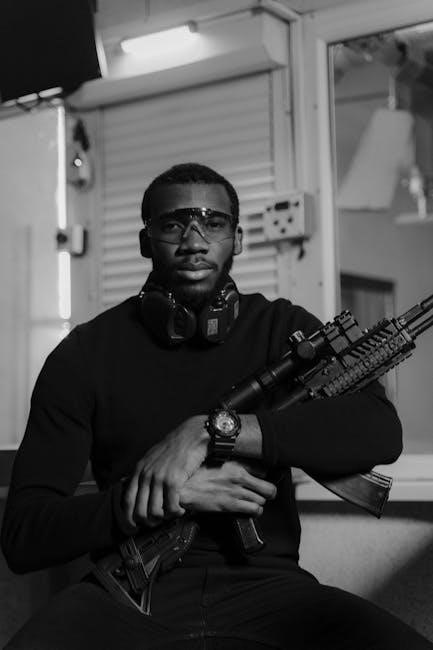
Sniper Manuals and Training Guides
Sniper manuals provide detailed techniques for precision shooting and tactical strategies. The Ultimate Sniper by John Plaster is a renowned guide, offering advanced training methods and real-world applications for military and law enforcement professionals, ensuring effectiveness in high-stakes environments.
Overview
The Sniper by Jim Lindsay provides a comprehensive look into the life of Chuck Mawhinney, the deadliest sniper in Marine Corps history. The book, written with Mawhinney’s full cooperation, details his 103 confirmed kills during the Vietnam War and his journey from a young recruit to a legendary marksman. It explores his post-war life, the psychological toll of his actions, and his eventual acceptance of fame, offering a gripping and insightful portrayal of a sniper’s legacy.
Importance
The Sniper holds significant value as a historical and educational resource, offering insights into the art of sniping and its psychological impact. It preserves the legacy of Chuck Mawhinney, highlighting his unparalleled skills and contributions to military history. The book serves as a vital tool for understanding sniper operations, making it essential for military historians, enthusiasts, and those seeking to comprehend the mental and physical challenges faced by snipers in combat.
“The Sniper Anthology”
The Sniper Anthology is a comprehensive collection of insights from renowned experts, offering a detailed exploration of sniping history, techniques, and its impact on warfare. This anthology provides a rich understanding of the evolution of sniping, making it a valuable resource for historians and enthusiasts alike.
Content
The Sniper Anthology delves into the history and evolution of sniping, featuring contributions from military historians and former snipers. It explores iconic figures like Chuck Mawhinney and Vasily Zaitsev, detailing their techniques and psychological challenges. The anthology also examines the cultural impact of snipers in literature and film, offering a well-rounded perspective on their role in warfare and popular culture.
Significance
The Sniper Anthology holds historical and cultural significance by documenting the evolution of sniping and its impact on warfare. It preserves the stories of legendary snipers like Chuck Mawhinney, offering insights into their skills, mental resilience, and ethical dilemmas. The anthology bridges history and modern times, providing a valuable resource for military professionals and enthusiasts while honoring the legacy of these precision warriors.
“The Sniper Pocket Book”
The Sniper Pocket Book, updated in 2024, serves as a compact yet comprehensive guide for snipers, detailing techniques and strategies. It is a practical resource for military and law enforcement professionals, emphasizing precision and effectiveness in high-stakes situations.
Features
The Sniper Pocket Book offers detailed insights into sniper techniques, featuring updated tactics, practical advice from experienced snipers, and historical context. The 2024 edition includes contributions from renowned military experts, making it a valuable resource for both professionals and enthusiasts. Its compact size and comprehensive coverage make it an essential guide for mastering the art of precision shooting in various combat scenarios.
Audience
The Sniper appeals to military professionals, veterans, and history enthusiasts. It also attracts readers interested in true war stories and memoirs. The detailed insights into sniper techniques make it valuable for tactical enthusiasts, while the personal narrative engages those seeking a human perspective on warfare. Additionally, students of military history and strategy will find the book’s historical context and psychological depth highly informative and engaging.

Psychology of a Sniper
Snipers possess mental resilience and focus, but their work exacts a profound emotional toll, shaping their psyche in unique and often isolating ways.
Mental Traits
Snipers exhibit exceptional patience, discipline, and emotional detachment. They thrive under pressure, maintaining focus amidst chaos. Their mental resilience allows them to cope with the moral weight of their actions, yet the toll of repeated killing often leaves lasting psychological scars, as seen in The Sniper, where Chuck Mawhinney grapples with the consequences of his deadly precision.
Ethical Considerations
The role of snipers raises profound ethical questions about the morality of targeting individuals in warfare. The Sniper highlights the moral dilemmas faced by Chuck Mawhinney, as he confronts the psychological toll of taking lives; Ethical debates surrounding sniping often focus on the balance between military necessity and the human cost, sparking broader discussions about the nature of war and its impact on humanity.
Sniper stories offer a gripping exploration of warfare, blending heroism with moral complexity. The Sniper leaves a lasting impact, shedding light on the psychological toll of combat and its enduring legacy.
The Sniper by Jim Lindsay delves into the extraordinary life of Chuck Mawhinney, the deadliest Marine Corps sniper in Vietnam; With 103 confirmed kills, his story reveals the psychological toll of warfare, the skill required for such precision, and the lasting impact of his legacy. The book offers a raw, unfiltered look at the realities of combat, making it a compelling read for history enthusiasts and those interested in military heroism.
Final Thoughts
The Sniper offers a profound exploration of warfare’s psychological and ethical complexities. Beyond detailing Chuck Mawhinney’s extraordinary feats, it humanizes the sniper’s experience, revealing the emotional weight of their role. This narrative not only honors military service but also challenges readers to reflect on the moral ambiguities of conflict, leaving a lasting impression on the understanding of warfare and human resilience.
